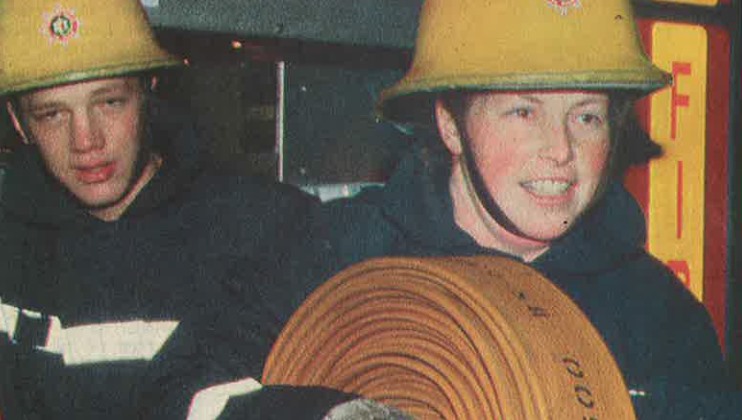From the length of her hair to the size of her uniform, Northern Ireland’s first female firefighter found herself facing challenges that would be unthinkable for women joining the service today. A true trailblazer, Heather Smart was recently named in the New Year’s Honours list as an MBE recipient in recognition of how she helped pave the way for women signing up for the role.
Heather (53), who hung up her helmet last year after 27 years on the front line, has been honoured for how she actively promoted the career to girls in Belfast schools.
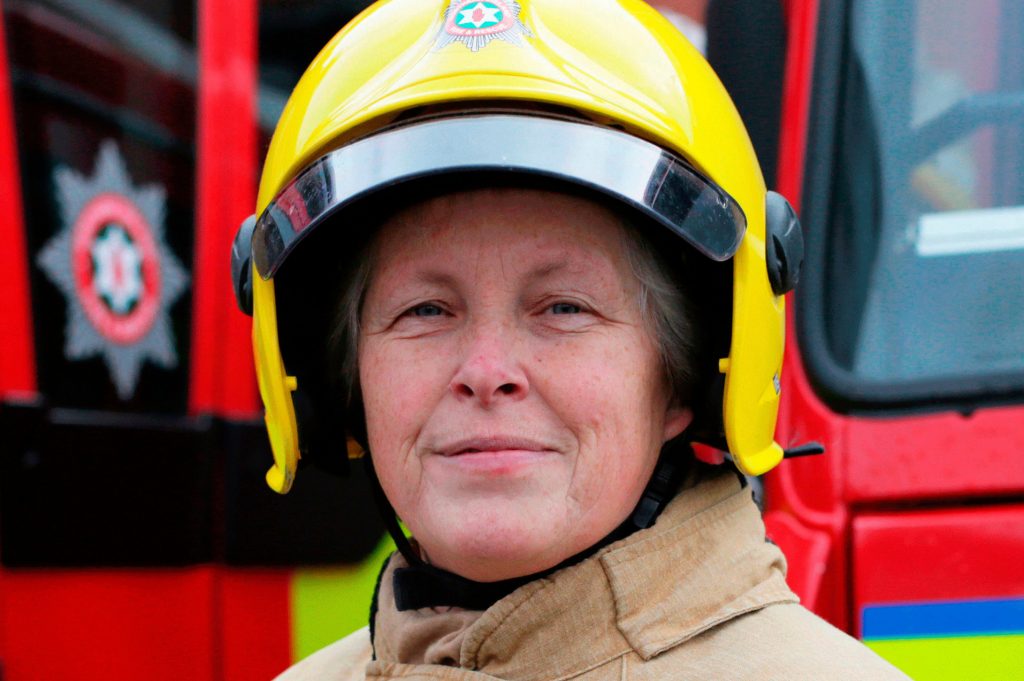
An unassuming woman, who is mum to 14-year-old Lewis, Heather lives in Ballyclare and says she never intended to be a history maker but merely wanted a fulfilling career. which would fulfil her.
Looking back to 1991 when she first applied to the Fire Service, and recalling the hurdles she had to overcome simply because of her gender, provides a fascinating insight.
Geared for its all-male workforce, the service was forced to adapt to accommodate its first female crew member and many changes were made before another woman was to join nine years after Heather. That progress has been made is evident in the station Heather served in, where a woman is now in charge of the watch.
Although there are still only 69 women in a team of over 1,800 personnel, the NI Fire and Rescue Service (NIFRS) actively campaigns to persuade young girls to consider it as a future career and more women to join its ranks.
When Heather left school at 18, initially she wasn’t sure what career she wanted to follow. She worked in a number of jobs over the first few years, including being a physiological measurement technician in the cardiac unit of the Royal Victoria Hospital in Belfast. That work meant she had to train in first aid, which stood her in good stead when she did apply for the Fire Service in her mid-20s.
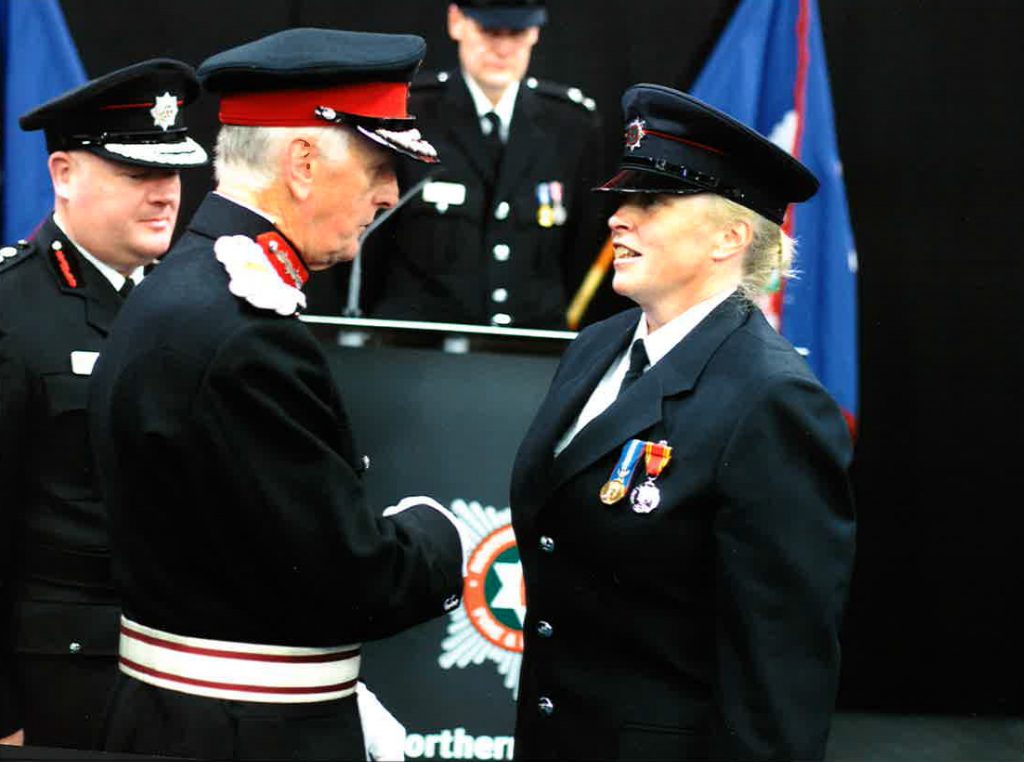
“The job in the Royal Victoria Hospital was an important job but it didn’t give me what I needed and after three years I left,” she says now.
“I then thought I wanted to live overseas and had applied to go and live in Canada. In the time it took for the visa to come through I went to Scotland to work in a hotel as a barmaid and I was surprised by how much I missed Northern Ireland. I was really homesick and that settled me and put that idea out of my head.
“I looked at what I wanted in a job, which was a physical challenge, something that would be different every day and also involved working directly with the public.
“I narrowed it down to three careers which were the police, Fire Service and Prison Service. I didn’t fancy the police or Prison Service at that time and decided to go for the Fire Service.”
Though her appointment was to prove groundbreaking, Heather admits that thought never occurred to her: “It didn’t strike me that I was going to be the first female if I got it. I wasn’t aware of how big a step it was, for them or for me. My attitude was that if I met the criteria then I could do the job and hopefully pass all the training.”
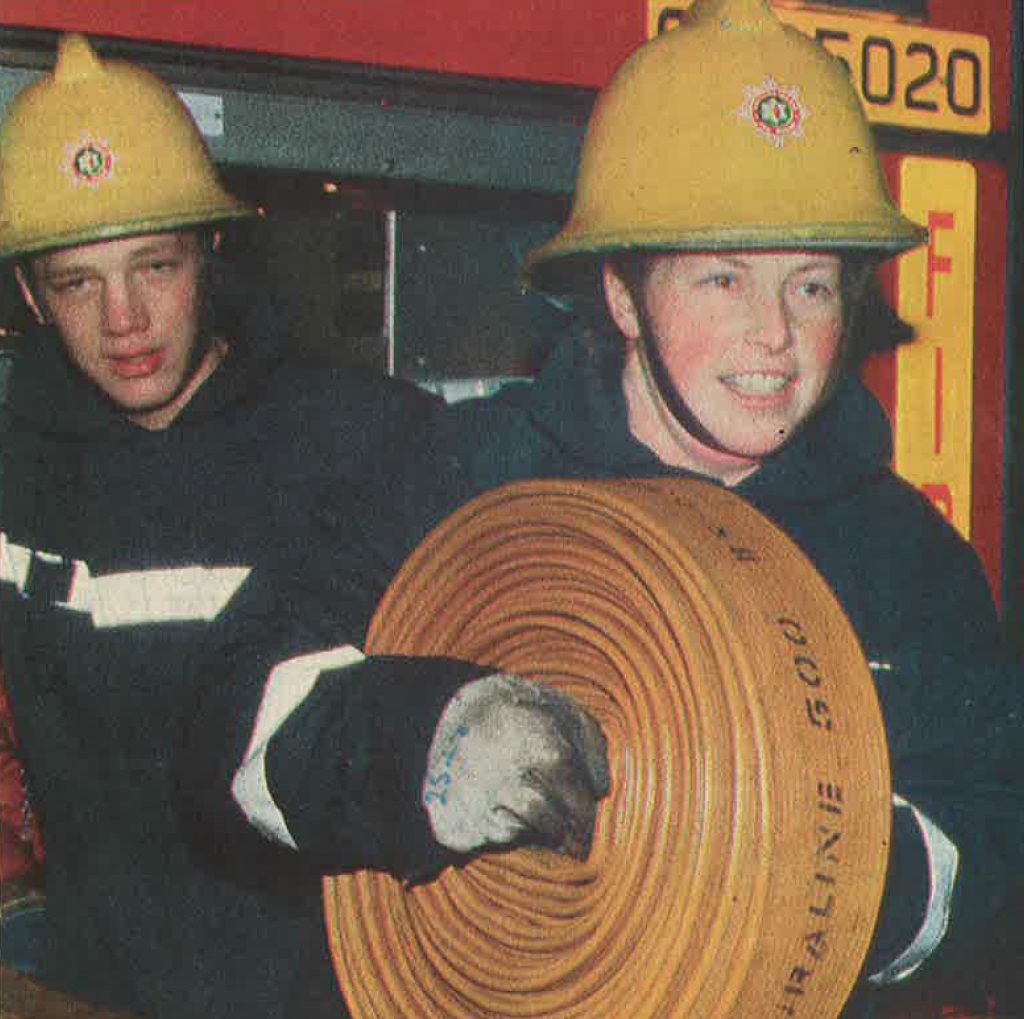
However, even the entry criteria were heavily weighted against women and Heather faced her first obstacle at the initial application stage.
She says: “At that time only people with a certain chest size could apply. They took the measurement under the bust and, as a woman, I didn’t measure large enough so I didn’t get in. Thankfully they dropped that rule, I applied again, and was successful the second time.
“I did learn later that even before I went into training there were discussions about whether I should be offered a different contract to my male colleagues or even if I should receive full pay. It was as if the Fire Service didn’t know how to deal with me because I was a woman.”
During training the rules were again put to the test when Heather was ordered to cut her long flowing blonde hair — not once but five times.
She explains: “The rule was that the hair should not touch the collar. I got my hair cut before training because I knew this. At the time it was really long down my back.
“I was taken out of training one day and sent to the barber’s to have it cut even shorter. I was ordered to have five hair cuts in those first weeks of training. In the end my hair was shorter than many of the men’s hair.
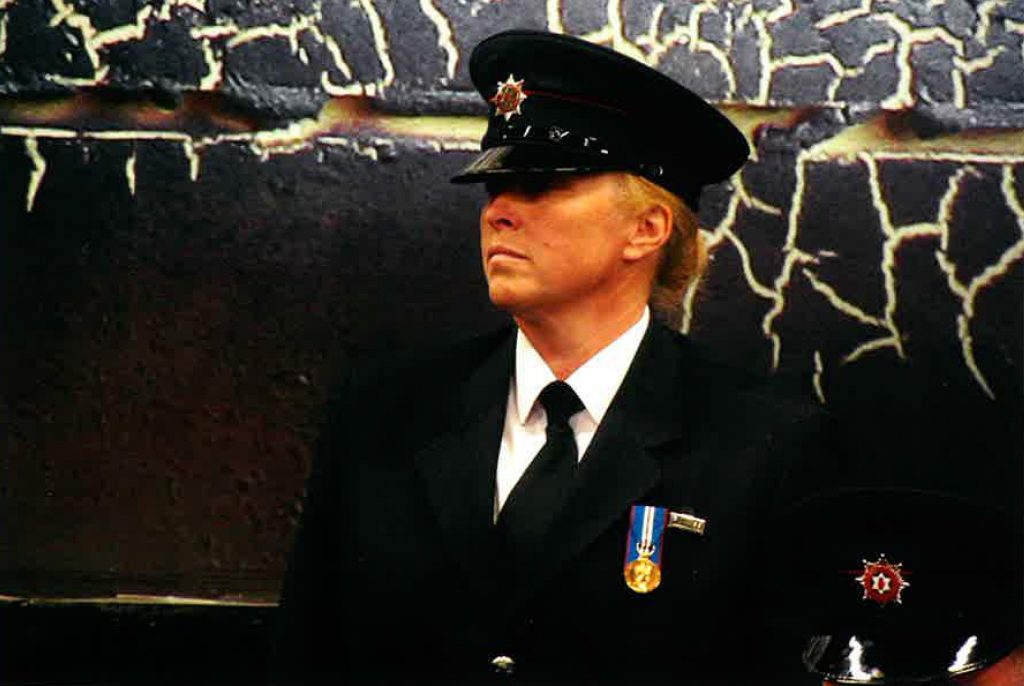
“The training centre was very good, though, and credit has to go to the staff there who took me at face value and whose attitude was that if I could do what they asked then there was no reason why I shouldn’t be there.”
It was halfway through her 14-week training period that the enormity of what she was doing in terms of breaking a glass ceiling hit home.
As the only woman in the changing rooms at the end of each day, she felt adrift with no one to discuss her concerns with.
She recalls: “About week six into training I had a wobble when, for the first time, I felt the pressure of being the first woman and being able to do the job right and not let every other woman down.
“At the training school we were in separate changing rooms and I was by myself and didn’t have anyone to talk to. I am sure the guys were able to let off steam and talk to each other. Some of them might have also been feeling anxious that they weren’t going to make the grade.”

After training, Heather joined the Watch Crew at Knock Fire Station in Belfast, where she served for her whole career. Having already passed her HGV licence, she was thrilled to be given the job of driving the fire appliances.
But before she could even start, the service was presented with some practical challenges, not least the size of the uniform, which was designed for men.
Heather says: “There were no facilities for women in the station for washing and changing. I had to go into the toilet to get changed.
“I was lucky that I have big feet as the smallest boot was size 6 and they fitted me. Also, as women have smaller hands, the gloves we had to wear were too big. These are all issues which have been addressed and the stores now offer a variety of sizes.”
Despite the novelty for her colleagues of having a female on the team, Heather says everyone was largely welcoming. Initially, however, she had to get used to some members of the public being rather shocked to see a firewoman, but again she says most people were supportive.
“When I had my helmet on nobody knew I was a woman as with the bulky uniform it wasn’t possible to tell,” she explains. “So when I took my helmet off you could see the surprise on people’s faces.
“Back in those early years some people did say to me that they didn’t think it was a job for women”
Heather Smart
“Back in those early years some people did say to me that they didn’t think it was a job for women.
“My attitude was that I would rather they tell me what they were thinking because then I could engage in dialogue with them.
“Everyone has their strengths and weaknesses and I am sure there were some parts of the job that people felt I wasn’t doing as well as they could, but there were certainly other parts I did better than them.
“You work as a team and you work to people’s strengths, and of the group of 23 people who I trained with in 1991, there wasn’t one who said that I shouldn’t be there.”
Heather helped save many lives during her career and attended many traumatic incidents.
One that stands out for her was the death of a young mum in her home on Boxing Day. She had died from toxic fumes caused by leaving a candle lit. Mercifully, her children were not in the house at the time. A few years ago the emotional fallout of dealing with so many tragic incidents caught up with Heather and she benefited from counselling at Jubilee House, Fire Fighters Charity’s centre in Penrith, Cumbria.
She says: “When I first started there were no debriefs after we attended tragic incidents, although that was introduced later. I think because of my age and gender I became something of a mother figure to some of the firefighters I worked with and provided a listening ear.
“The tipping point came a few years ago when I realised my colleagues were coming to me to talk, but I couldn’t listen because of how I was feeling and that was affecting my ability to help them. I had started to get symptoms which made me realise I needed to address how I was feeling. I was getting smells and taste sensations which were intruding on my normal life.
“I had two weeks of daily counselling with the charity. That gave me permission to talk about stuff in a non-judgemental atmosphere, which really helped.”
Since retiring last year Heather has started a degree in speech and language therapy at Ulster University.
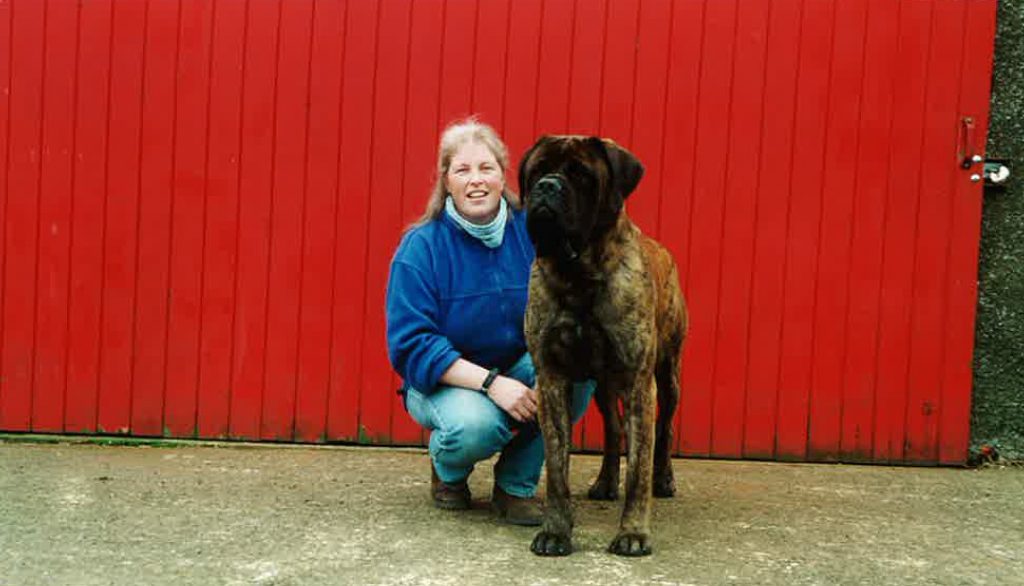
She is delighted the Fire Service has come so far and that more women are among the ranks. She is also “surprised but thrilled” to have been awarded an MBE.
She adds: “Whenever we have an open day and you see the sheer number of women there, it makes you realise that the barriers which were in people’s heads that women couldn’t do this job are slowly being eliminated. I’ve had a wonderful career and I’ve loved every minute of it. It is a job I would recommend, not just to women but to men.
“To be honoured for it with an MBE is still a real surprise. I thought it was a wind-up at first and I still don’t know who put me forward for it, but I am thrilled.”
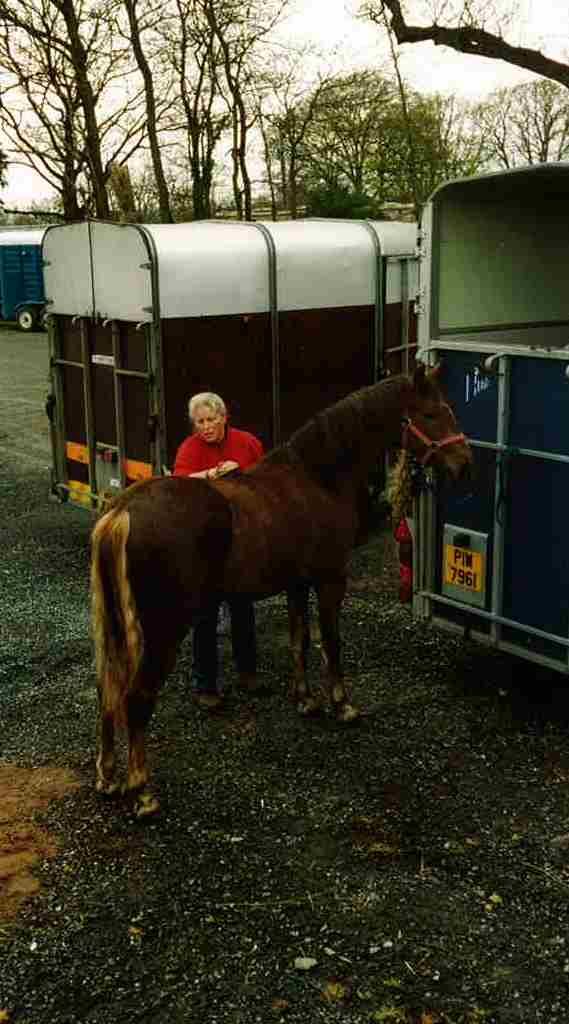
This article has been reproduced with permission from The Belfast Telegraph, who wrote the story.

